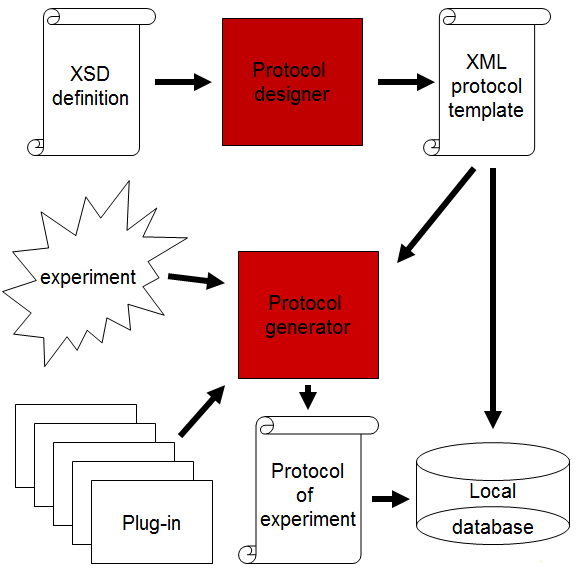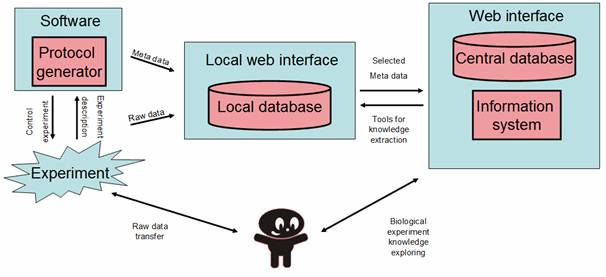Archives
now browsing by author
Protocol generator
It is an independent application that should ensure the repeatability and correctness of the biological experiments. The tool is designed to lead the experimenter through the particular type of experiment as a supervisor and help. Protocol generator has two purposes: the first one is to check that the procedure of the experiment has been done precisely and the second one is to produce all important settings that are part of the experiment in the form of report on the experiment. The method to ensure precise realization of experiment is to check if all necessary parameters and steps of the experiment have been set and done. The list of necessary parameters and steps for the particular type of experiment comes up from the analysis of biological experiment for different research institutes.
The description of the experiment can be created by the user for specific experiment. Graphical user interface Protocol designer has been implemented for this purpose. The protocol template is created by the person who fully understands the experiment and who can define all the important conditions of the experiment. The user can use 10 basic components for definition of the protocol. The protocol of experiment can be shared among the people who realize the experiment (students) to ensure the repeatability of the experiment.
The protocol is internally defined by XML language and has to follow the XSD scheme prescribed for experiment description. Templates of protocols can be stored in the local database for future usage. The template can be later modified for new experiment to speed up the process.
Main advantage of the electronic protocol is that there is a direct link between the protocol and experimental data. Both are stored in the central database and can be used for obtaining future data.
Protocol generator supports external plugins for mining information about setting of devices from external files. The plugins can read the information about some parameters of experiment form files produced by measurement device (magnification of microscope) and fill it into the protocol. Plugins are using open interface and therefore it can be created by the users for specific devices.
Collection and analysis of experimental procedures
The first year of the project is focused on monitoring and analysis of the situation on the field of biology experiments. Many research institutes and organizations will participate on this most important part of understanding the needs of the experimentalists. The needs of different types of research organizations on biology experiments will be collected and analyzed. The questionnaire with questions concerning the type of experiment, needed equipment, experimental procedure, data storage, data sharing etc. has been prepared for this purpose. The output of the first year analysis will be knowledge about data types produced by biology experiments, realization of experiments and data management. Each of the participants of the initial analysis will be able to influence the final solution of the project. They can influence the design and functionality of the Protocol generator, local data management tool and global web based data sharing tools. It is a unique opportunity to get free solution for the whole chain of experimentation actions.
BioWES – Project description
Project BioWes is a collaborative project of University of South Bohemia in České Budějovice represented by Institute of Complex Systems and private company dataPartner ltd. that works on delivery and implementation of information and control technologies. The type of the solution of the project is applied research. Institute of Complex Systems is responsible for the research part of the project focused on biology experiments (see more here). DataPartner is going to deliver database and web based solutions for data management and sharing (see more here).
The project BioWes is inspired by several similar projects that try to solve a substantial contemporary problem of sharing big amount of experimental data. There are several projects that offer the solution for data sharing (for different types of data). The problem is that the amount of data produced by experimentalist is constantly increasing and the speed of internet will always be a step behind. The only way how to share experimental data on between researchers is to share the metadata. Metadata means the overall knowledge about the experiment that consist of detailed knowledge of experimental procedure and knowledge that can be mined from the data automatically or manually by post-processing. The data itself is meaningless without any additional knowledge concerning the experiment. There is no project that can offer experimental data sharing based on the sharing of knowledge.
The main reason why to share the experimental data is to save money and time necessary for experimentation and to compare the results between different experimenters. Data sharing and especially metadata sharing can be understood as the advertisement of the experiments of a particular experimenter. Experimental data sharing and comparison can help to improve experimental procedures and definition of standards in this area.
Project BioWes is focused on the area of biology experiments. These experiments produce one of the biggest amounts of data and impose the highest requirements on the preciseness of experimentation to reproduce the experiment.






 D5 Creation
D5 Creation